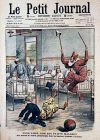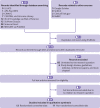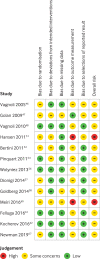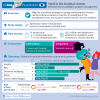Effectiveness of hospital clowns for symptom management in paediatrics: systematic review of randomised and non-randomised controlled trials
- PMID: 33328164
- PMCID: PMC7737653
- DOI: 10.1136/bmj.m4290
Effectiveness of hospital clowns for symptom management in paediatrics: systematic review of randomised and non-randomised controlled trials
Abstract
Objective: To evaluate evidence from randomised controlled trials and non-randomised controlled trials on the effectiveness of hospital clowns for a range of symptom clusters in children and adolescents admitted to hospital with acute and chronic conditions.
Design: Systematic review of randomised and non-randomised controlled trials.
Data sources: Medline, ISI of Knowledge, Cochrane Central Register of Controlled Trials, Science Direct, Scopus, American Psychological Association PsycINFO, Cumulative Index to Nursing and Allied Health Literature, and Latin American and Caribbean Health Sciences Literature.
Study selection: Randomised and non-randomised controlled trials were peer reviewed using the following eligibility criteria: children and adolescents who were admitted to hospital for acute conditions or chronic disorders, studies comparing use of hospital clowns with standard care, and studies evaluating the effect of hospital clowns on symptom management of inpatient children and adolescents as a primary outcome.
Data extraction and synthesis: Two investigators independently screened studies, extracted data, and appraised the risk of bias. Methodological appraisal was assessed by two investigators independently using the Jadad scale, the revised Cochrane risk-of-bias tool for randomised controlled trials (RoB 2), and the risk of bias in non-randomised studies (ROBINS-I) tool for non-randomised controlled trials.
Results: 24 studies (n=1612) met the inclusion criteria for data extraction and analysis. Most studies were randomised controlled trials (n=13). Anxiety was the most frequently analysed symptom (n=13), followed by pain (n=9), psychological and emotional responses and perceived wellbeing (n=4), stress (n=4), cancer related fatigue (n=3), and crying (n=2). Five studies used biomarkers, mainly cortisol, to assess stress or fatigue outcome following hospital clowns. Most of the randomised controlled trials (n=11; 85%) were rated as showing some concerns, and two trials were rated with a high risk of bias. Most non-randomised controlled trials (n=6; 55%) were rated with a moderate risk of bias according to ROBINS-I tool. Studies showed that children and adolescents who were in the presence of hospital clowns, either with or without a parent present, reported significantly less anxiety during a range of medical procedures, as well as improved psychological adjustment (P<0.05). Three studies that evaluated chronic conditions showed favourable results for the intervention of hospital clowns with significant reduction in stress, fatigue, pain, and distress (P<0.05).
Conclusions: These findings suggest that the presence of hospital clowns during medical procedures, induction of anaesthesia in the preoperative room, and as part of routine care for chronic conditions might be a beneficial strategy to manage some symptom clusters. Furthermore, hospital clowns might help improve psychological wellbeing in admitted children and adolescents with acute and chronic disorders, compared with those who received only standard care.
Systematic review registration: PROSPERO CRD42018107099.
© Author(s) (or their employer(s)) 2019. Re-use permitted under CC BY-NC. No commercial re-use. See rights and permissions. Published by BMJ.
Conflict of interest statement
Competing interests: All authors have completed the ICMJE uniform disclosure form at www.icmje.org/coi_disclosure.pdf and declare: support from CAPES for the submitted work; no financial relationships with any organisations that might have an interest in the submitted work in the previous three years; no other relationships or activities that could appear to have influenced the submitted work.
Figures





References
-
- Amorim MHC, Lopes-Júnior LC. Psychoneuroimmunology and nursing research: discovery, paradigm shifts, and methodological innovations. Acta Paul Enferm 2021;34:1.
Publication types
MeSH terms
LinkOut - more resources
Full Text Sources
Medical
Miscellaneous
